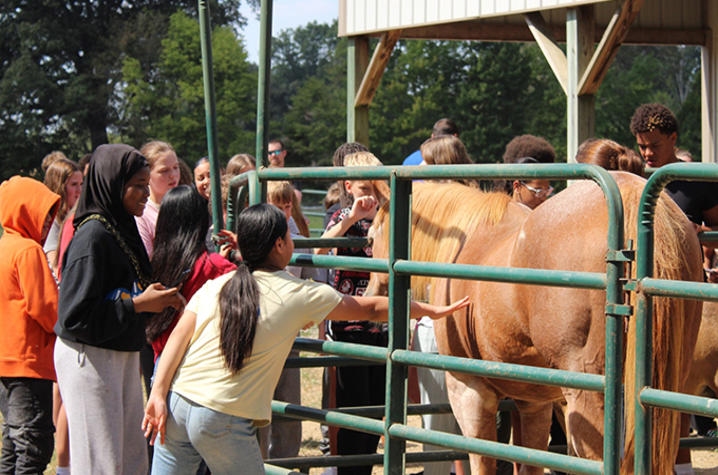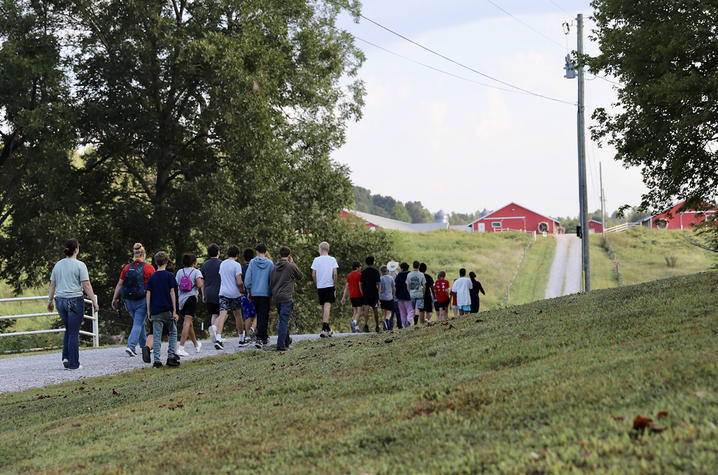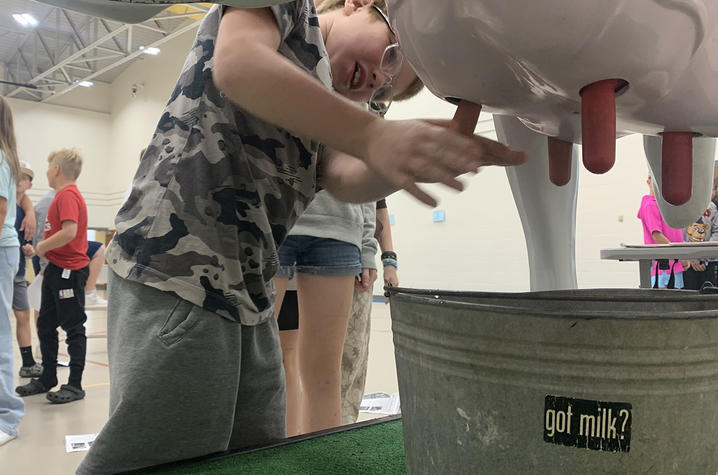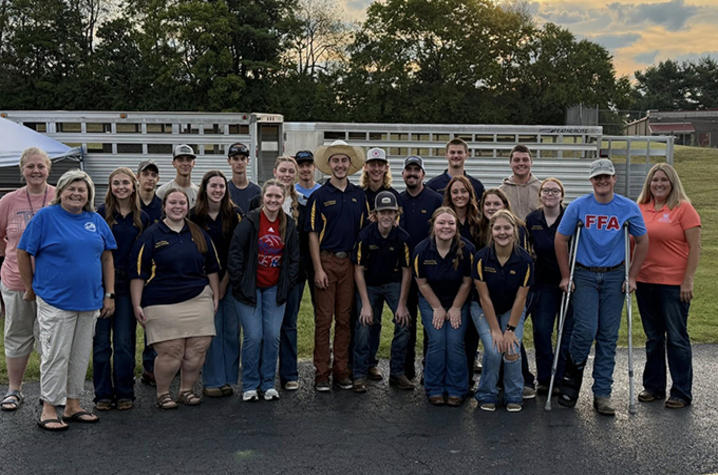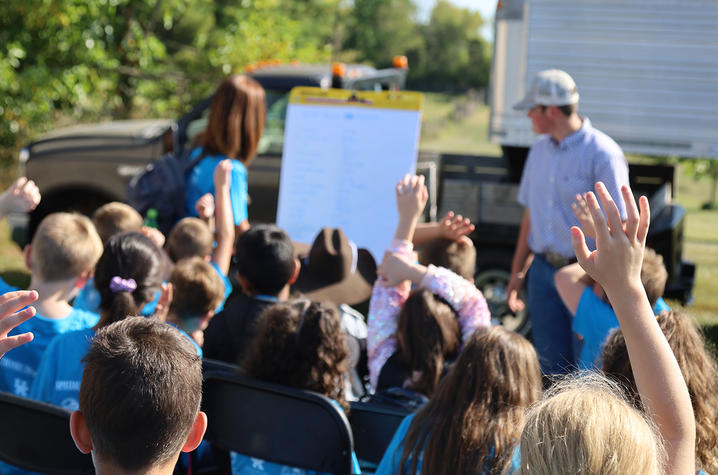‘We’re planting seeds': UK Extension connects local farms, learning during All in for Agriculture Education Week
LEXINGTON, Ky. (Oct. 3, 2025) — School playgrounds became barnyards and Kentucky farms welcomed thousands of students and visitors during All in for Agriculture Education Week, Sept.15-19.
The initiative was a collaboration among Commissioner of Agriculture Jonathan Shell, Lt. Gov. Jacqueline Coleman and Commissioner of Education Robbie Fletcher. The University of Kentucky Cooperative Extension Service at the Martin-Gatton College of Agriculture, Food and Environment helped amplify those efforts.
Several local extension offices across the Commonwealth transformed learning into hands-on exploration — connecting Kentuckians of all ages with the land, animals and technologies that grow food, jobs and local economies. Playing a crucial role in agriculture education, extension translates UK’s expertise to practical information for local communities.
“Agriculture education works best when it’s hands-on, and that’s exactly what Kentuckians experienced during Ag Education Week,” Shell said. “Our partnership with county extension offices makes it possible to connect students and communities with real-life lessons about farming, food and the people who make agriculture thrive in Kentucky.”
Linda McClanahan, Mercer County agriculture and natural resources extension agent, aligned their FarmSCool Week with KDA’s All in for Agriculture Education Week. In its 17th year, FarmSCool is a beloved tradition that introduces elementary students to agriculture in their own backyard.
“We’re not just teaching — we’re planting seeds of curiosity,” McClanahan said. “This program has grown because of the incredible support from our partners and volunteers.”
FarmSCool Week included two major events: Ag Exploration Day for third graders at the Mercer County Cooperative Extension Office and Farmin’ on the Playground for pre-K through second grade students at Mercer County Elementary School. The latter featured 10 interactive stations set up beside the school parking lot, where students rotated through experiences with animals, crops, machinery and local farm experts.
FFA members, extension staff and community partners (Mercer County Farm Bureau and Family Resource and Youth Services Center) helped bring the event to life. “We’re grateful for every person who makes FarmSCool Week possible,” McClanahan added. “It’s a true community effort.”
Cheryl Burks-McCarthy, extension program assistant for Daviess County Cooperative Extension, took a bold idea and turned it into a district-wide movement. What began as a one-day event evolved into a four-day agriculture immersion experience for all 5,000 students at Owensboro Public Schools.
“I pitched a small idea to the superintendent, and by the time I left her office, she wanted programming for every student,” Burks-McCarthy said.
The result was a sweeping collaboration involving more than 20 local partners, including Cargill, Hayden Farms, Owensboro Community and Technical College (OCTC), and the Owensboro Regional Farmers’ Market. Students explored a wide range of topics, including chicken farming, equine nutrition, soil science and drone technology.
At Foust Elementary, students were treated to ice cream donated by Prairie Farms and a visit from the Southland Dairy Farmers Mobile Dairy Classroom. Instructor Isreal Mullins brought a live cow and demonstrated the milking process. “I like how the cow wanted to be milked, because he explained that sometimes a cow can hold their milk,” Bella Burgos, a Foust second grade student, said.
Alicia Storm, director of instruction for Owensboro Public Schools, sees these events as a powerful example of community collaboration.
“The agriculture week programs brought vibrant, hands-on learning opportunities into Owensboro Public Schools — experiences that opened students’ eyes to a side of agriculture many had never experienced,” she said. “Today’s agricultural world is powered by innovation and technology, far beyond the traditional image of farming.”
Burks-McCarthy sees these moments as essential to addressing labor shortages and attracting young talent to the industry. “We’re planting seeds — literally and figuratively,” she continued. “We want students to understand where their food comes from and see themselves in these careers.”
With plans already underway for next year, Burks-McCarthy hopes to expand reach and deepen the impact. Sponsors such as Wright Implement have already committed to support activities in 2026 due to this year’s success.
Other county extension offices joined the week-long celebration with their own events — showcasing the diversity of Kentucky agriculture through school visits or organizing farm field trips. While not all outreach events were held during the dedicated week, many extension offices work with their communities to offer a variety of agriculture opportunities throughout the year.
“I believe it is crucial for the Cooperative Extension Service to be involved in providing agricultural awareness due to the small percentage of our population involved in production agriculture,” McClanahan said. “We serve as a vital bridge between agricultural knowledge and community needs, and it is so important for younger generations to understand where their food, fiber, fuel and other farm products come from.”
To learn more about All in for Agriculture Education Week, visit https://www.kyagr.com/marketing/Ag-Education-Week.html.
To learn more about the role of Cooperative Extension in agriculture education, visit https://extension.ca.uky.edu/.
As the state’s flagship, land-grant institution, the University of Kentucky exists to advance the Commonwealth. We do that by preparing the next generation of leaders — placing students at the heart of everything we do — and transforming the lives of Kentuckians through education, research and creative work, service and health care. We pride ourselves on being a catalyst for breakthroughs and a force for healing, a place where ingenuity unfolds. It's all made possible by our people — visionaries, disruptors and pioneers — who make up 200 academic programs, a $476.5 million research and development enterprise and a world-class medical center, all on one campus.





